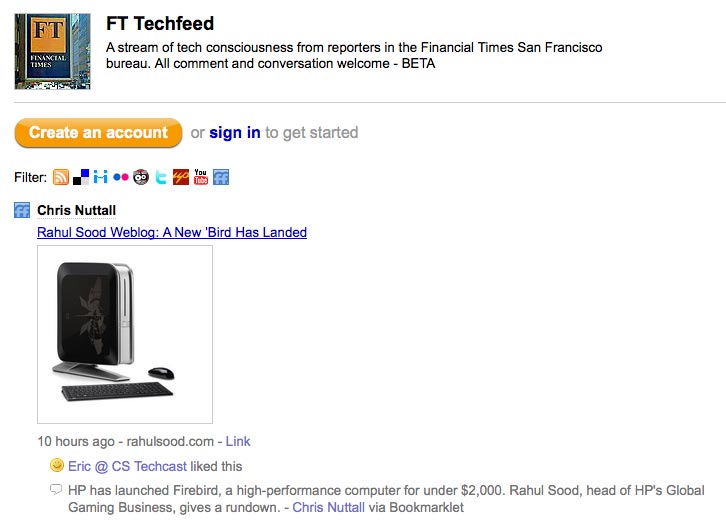Roland Legrand suggests seven ways “to keep costs low, content fresh using social media”. He also adds: “Never give up on training”.
Tag Archives: Flickr
Theage.com.au: Social media among the Australian bushfires
Asher Moses of The Age looks at the role of social media such as Twitter, Flickr and Facebook have played during the fatal bushfires that have raged through Victoria in Australia
CnetNews: Flickr users invited by Getty to join collection
This week certain Flickr users began receiving invitations from the photo agency Getty, as part of a new partnership between the agency and Yahoo. A special Flickr-branded Getty collection will be launcing in March. Full story…
Feeds feast for FT: new corporate RSS and FriendFeed experiment
(Try saying that headline 10 times fast)
First up, the Financial Times has announced a new RSS service for corporate users – an add-on for those paying subscribers who signed up for the site’s direct licence system introduced in April last year.
The customisable RSS feed will be available to corporate customers, who under the licence arrangement are entitled unlimited access to FT content on FT.com and third-party services, and can be tailored by specific search terms, a press release from the title said.
Not full-fat feeds as yet – users will click through to read articles on the main website.
Elsewhere, technology journalists at the FT’s San Francisco bureau have been experimenting with FriendFeed to create a single source of their links, articles and blog posts (it can also be used for Twitter and Flickr updates):

Getty teams up with Yahoo to tap into Flickr users
Getty Images is to collaborate with Yahoo-owned image-sharing site Flickr to harness the potential of the site’s members.
Through the partnership Getty will invite Flickr members to contribute their images to a ‘Flickr branded collection’ on the agency’s website. Pics in this collection will then be made available for licensing by Getty’s clients.
Editors from Getty will select the members and the two companies are currently working on online tools for contacting Flickr users.
Members who chose to submit their images to the collection will hand over exclusive commercial rights of the photos to Getty.
“Flickr members will benefit from Getty Images’ global sales and distribution teams helping to market their images and from Getty Images’ expertise and experience in rights and clearances of visual content. Getty Images’ customers will benefit from the fresh, unique and individualistic perspectives of members within Flickr’s global community,” a release from Yahoo said.
A launch date for the collection is yet to be announced.
Social Media Journalist: “The problem with most news organisations is a lack of editorial understanding of social media” Kevin Anderson, Guardian blogs editor
Journalism.co.uk talks to reporters across the globe working at the collision of journalism and social media about how they see it changing their industry. This week, Kevin Anderson, Guardian.co.uk.
1) Who are you and what do you do?
Kevin Anderson, blogs editor at Guardian.co.uk.
My title is misnomer seeing as desk editors handle most of the commissioning.
My role is two-fold. I spot newsworthy items bubbling up in social media – blogs, social news sites, Twitter, etc – and report on that or pass it along to the appropriate site editor.
I also seed and develop strategies to promote Guardian content in those social networks. My current focus is what I call real-time innovation. I use emerging tools for editorial purposes and feed back lessons we learn into our editorial development process.
2) Which web or mobile-based social media tools do you use on a daily basis and why?
People ask me how I stay on top of it all, and I say that my network is my filter. I have Twhirl and IM on constantly, sitting in the background. New media professionals and contacts around the world pass me things I need to read or stories I need to follow up on through Skype, Twitter, IM and Del.icio.us.
Popurls.com is a great one-stop site for buzz, especially for the US elections, which I’m following right now. NetNewsWire, Flock and Ecto are my blogging tools of choice.
The Flock browser is good in a number of ways. Its Flickr uploader is great – better than Flickr’s until recently. It also allows you to add sites to multiple Del.icio.us accounts.
You can go from reading your RSS feeds to blogging instantly in Flock, as it pulls NetNewsWire functionality into the browser too.
For publishing, a combination of Ecto and any good blogging platform creates the best multimedia journalism tool that I’ve ever used.
I recently got a Nokia N82. With its stellar camera and integrated Flickr uploader it has a lot of promise , but it’s hampered by poor data plans in the UK.
The mobile carriers are focusing on USB-based data plans to link computers to the mobile web, which maybe a good start, but there are still too few good data plans for phones.
I end up relying on WiFi, which on the N82 is much better than on previous phones.
3) Of the thousands of social media tools available could you single one out as having the most potential for news either as a publishing or newsgathering tool?
I think in terms of editorial objectives and then find an applicable tool. In 12 years of doing online journalism, I’ve had to learn hundreds of desktop tools, content management systems and now a dizzying range of social media tools.
You have to be aware of them to work effectively. Knowing about the tools allows me to do something on deadline without worrying whether it can be developed on time.
However, the problem with most news organisations isn’t a lack of tools or technology but a cultural lack of editorial understanding of social media, internet media and internet culture.
Most news organisations continue to try to force their existing editorial strategies into the social media space instead of considering editorial strategies that are appropriate for the space.
Online video isn’t television on the internet, just as blogs are not about publishing a newspaper with comments.
I can use Twitter both as a newsgathering and promotional tool, or I can just use it to broadcast headlines at people.
Social media can increase loyalty from visitors to a site and increase the time they spend on the site, but it’s not about the tools but the way that journalists use them.
4) And the most overrated in your opinion?
I hate to sound like a broken record because others have said this before, but I really think Facebook is overrated for the majority of our audiences.
Traditional journalists who had never seen, much less used a social network before, hyped it because it was a revelation to them.
However, for those who had used social networks before, it was YASN – yet another social network – only shinier, with 20 per cent more Web 2.0 goodness.
I believe in freeing content and making it available where the audiences are, so it makes sense for content to be easily available to Facebook users and for news organisations to have a presence there.
News organisations can learn things from the success of Facebook, but they should also study the life cycle of social networks and learn not only from their successes but also from their failures.
Allowing like-minded readers or viewers to connect and interact using your content as a focus is a good social media strategy.
Hosting and taking an active role in the conversations around your content is also a good social media strategy.
Building a site or service that externalises community and keeps the ‘unwashed masses’ at a safe distance from journalists creates nasty overheads. It also means managing communities and brings nothing to your journalism and very little to your site visitors.
Why would Facebook users decide to move to InsertNewspaperHere-book?
Innovations in Journalism – a plug in to ease sorting through web images and video from PicLens
We give developers the opportunity to tell us journalists why we should sit up and pay attention to the sites and devices they are working on. Today, it’s searching easily though web images and video with PicLens.
1) Who are you and what’s it all about?
Hi, I’m Alec Jeong from Cooliris.
We’ve developed PicLens, a plug-in that transforms your browser into a 3D environment where you can search, drag, and zoom around thousands of images and videos across the web.
PicLens makes your online media come to life in a full-screen, cinematic presentation that goes beyond the confines of the traditional browser.
2) Why would this be useful to a journalist?
Journalist regularly search for photos and videos on the web, tediously clicking in and out of web pages and image search engines to find the perfect image or video.
PicLens changes all that, by allowing you to search and view 100s or even 1000s of online photos and videos in an instant.
Need to see the photo in detail? Just click a toggle button and the photo or video will go full screen. Jump to the corresponding page of the image or video? No problem.
3) Is this it, or is there more to come?
There is much more, much more to come. In the coming months, we will be adding features that will completely transform the way you use online media.
4) Why are you doing this?
We asked ourselves the question: What would the web be like if, rather than having to browse click by click, we were able find and share information quickly and directly through a single, rich media navigation layer that frees you from the confines of the traditional browser window and web pages?
We believe that you would discover that the web is richer than you’ve believed before, and that the added spatiality would enable you get much more from the rich online media and from your social connections.
5) What does it cost to use it?
PicLens is free to use and available for Firefox, Internet Explorer and Safari.
The “3D Wall” interface is available now for Firefox and IE and is coming to Safari soon.
6) How will you make it pay?
Our goal has always been to focus on providing the ultimate user experience. With several million downloads of our product in just the past few months, we are on a fast trajectory to bring in the next generation online media experience.
Social Media Journalist: “Facebook is overrated. The novelty is wearing off and people are getting bored” Matthew Buckland
Journalism.co.uk talks to reporters across the globe working at the collision of journalism and social media about how they see it changing their industry. This week, Matthew Buckland from Mail & Guardian, South Africa.
1) Who are you and what do you do?
I am Matthew Buckland, the GM of Mail & Guardian Online.
As head of the online division I am responsible for the overall online and mobile strategy, with an overview of editorial, production, technical and online sales.
I am also involved quite heavily in our social media strategies and sites.
2) Which web or mobile-based social media tools do you use on a daily basis and why?
I use Twitter, both web and mobile. I blog on my own blog about online media, web 2.0 and technology, thoughtleader.co.za and sometimes on Poynter’s new media titbits.
I use Mybloglog on my blog quite a bit. I use Facebook web and mobile… but less and less these days. At the end of last year I began using Slideshare to share my presentations and see others. I Digg every now and again, and use a local version, Muti.co.za.
I also keep half an eyeball on Linkedin – but don’t really do it justice. I am an occasional Del.ici.ous user. I use both Flickr and Picasa as online photo albums/photo sharing.
For video sharing I use Youtube, obviously. I’m also a wikipediaholic.
I used SecondLife for about a week, but realised it would be best for my health to shut it down and never look at it again
Generally I find these social media tools are a good way of networking, sharing ideas and content, and building relationships with people. They also waste a lot of time and create noise in my life.
3) Of the thousands of social media tools available could you single one out as having the most potential for news either as a publishing or newsgathering tool?
I think of all the hyped up social media tools we’ve seen, blogging has shown that it is more than just a fad, but here to stay.
We’ve seen how mainstream online publishers have embraced blogs both as new publishing formats and newsgathering tool with considerable success.
4) And the most overrated in your opinion?
I’m beginning to think Facebook is overrated. The novelty is wearing off and people are getting bored, very quickly.
Wired: Flickr groups reject new video feature
Several user groups on Flickr have been set up against the introduction of video to the image-sharing website, which was announced earlier this week.
Users are concerned that there was no pilot stage for the service, which allows ‘Pro’ subscribers to submit 90-second video clips alongside images.
By Thursday the ‘We Say No to Videos on Flickr’ group had more than 22,000 members.
News.com: Flickr video launch – pleasing but limited
Flickr video has arrived – after what seemed like an age – and CNET’s Dan Farber is impressed with the results, even if users are limited to 90 seconds of videos. Crazy, for my money.
‘It’s the video analog of Twitter, which limits users to 140 characters. It’s a fine communications constraint, but it doesn’t apply as easily to video content,’ says Faber.
While Flickr have been dillydallying, as Faber points out, YouTube has rocketed ahead with its offering.



